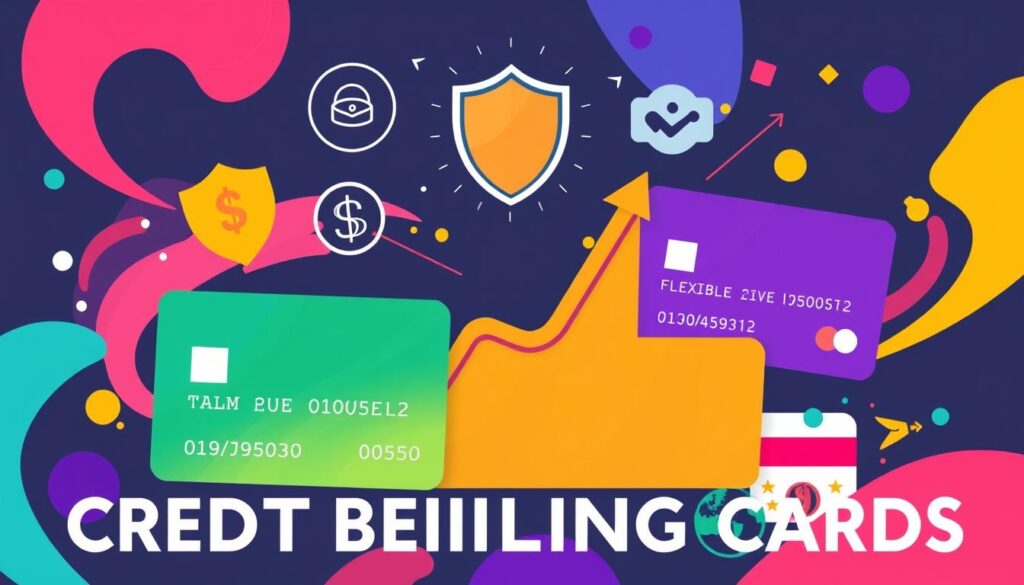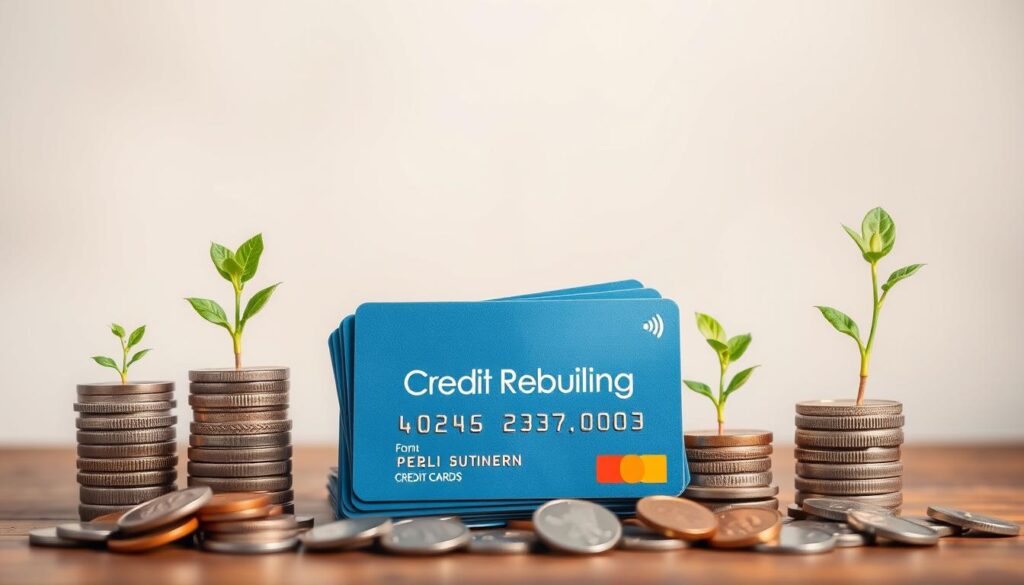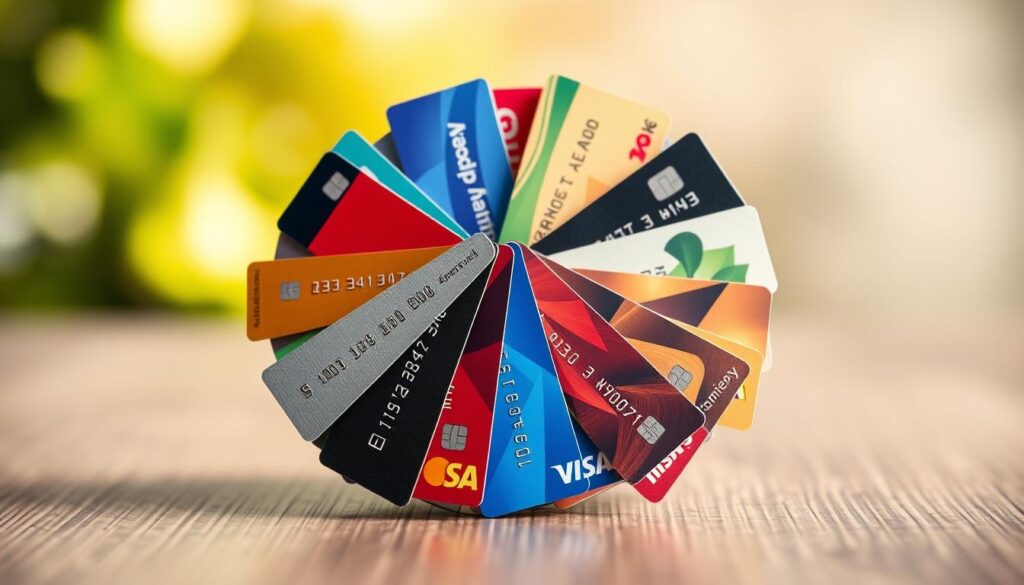We may earn money or products from the companies mentioned in this post.
Having a low credit score can feel really tough. It’s like hitting a wall when you try to get financial help. But, there’s hope with credit rebuilding cards.
Looking for the best credit cards for bad credit is more than just getting a card. It’s about finding a way to improve your financial standing. These cards are a key to getting back on track financially.
This guide will help you understand how to pick the right credit card when your score is low. We’ll cover everything from different card types to the best ways to improve your credit. Let’s make credit restoration easier to understand.
Key Takeaways
- Credit cards for bad credit can be powerful financial recovery tools
- Secured and unsecured options exist for different financial situations
- Careful card selection is crucial for credit rebuilding
- Responsible use can significantly improve credit scores
- Understanding fees and terms prevents further financial strain
Understanding Credit Cards for Bad Credit
Dealing with bad credit credit cards can be tough for those with low scores. These cards are a way for people to start fixing their credit and get back to using credit.
Credit can be hard to understand, especially for those with bad credit. Low credit score cards help people fix their credit. They give a chance to show they can manage credit well.
What Defines Bad Credit Scores
A bad credit score is between 300 and 579 on the FICO scale. It can come from:
- Late or missed payments
- High credit use
- Bankruptcy or foreclosure
- Little credit history
How Credit Cards Help Rebuild Credit
Cards for poor credit are great for fixing credit. They report your payments to big credit agencies. This lets you:
- Build a steady payment history
- Show you can use credit wisely
- Slowly raise your credit score
- Learn good financial habits
Types of Cards Available for Poor Credit
| Card Type | Key Features | Credit Impact |
|---|---|---|
| Secured Credit Cards | Need a cash deposit | Great for rebuilding |
| Unsecured Credit Cards | No deposit needed, but higher interest | Can improve credit a bit |
| Store Credit Cards | Only for certain stores, easier to get | Not much credit building |
“Credit is a second chance at financial freedom.” – Financial Recovery Expert
Choosing the right bad credit credit cards needs careful thought. You must think about your financial situation and goals.
Secured vs. Unsecured Credit Cards: Which Is Right for You
Understanding credit cards can be tough, especially for those with poor credit. Secured and subprime credit cards are two paths to financial recovery. Each has its own features, suited for different financial needs.
Let’s look at the main differences between secured and unsecured credit cards:
- Secured Credit Cards
- Need an upfront cash deposit
- The deposit is your credit limit
- Less risk for the credit card company
- Easier to get approved, even with bad credit
- Unsecured Subprime Credit Cards
- No deposit needed
- Have higher interest rates
- Harder to get approved
- May have more fees
Deciding between secured and unsecured credit cards depends on your financial situation and goals.
| Feature | Secured Credit Cards | Unsecured Subprime Credit Cards |
|---|---|---|
| Initial Deposit | Required | Not Required |
| Credit Limit | Matches Deposit | Based on Credit Profile |
| Approval Difficulty | Easy | Moderate to Difficult |
| Interest Rates | Lower | Higher |
“The right credit card can be a powerful tool for rebuilding your financial credibility.” – Credit Experts
When picking a credit card, think about your financial situation, credit score, and future goals. Secured credit cards are a good start for those with bad credit or no credit history.
Best Credit Cards for Bad Credit in [Current Year]
Getting a credit card with a low credit score is tough. But, there are credit builder cards and the best credit cards for bad credit to help. This guide will show you the top cards for your credit needs.
Top Secured Card Options
Secured credit cards are great for fixing your credit. They ask for a cash deposit that becomes your credit limit. This makes the card issuer feel safer.
- Discover it Secured Credit Card: No annual fee and cashback rewards
- Capital One Platinum Secured Credit Card: Low initial deposit requirements
- OpenSky Secured Visa Credit Card: No credit check needed for application
Best Unsecured Cards for Credit Building
Unsecured credit cards for bad credit are more flexible. They don’t need a security deposit. Using them wisely can boost your credit score.
- Credit One Bank Platinum Visa: Cash back on purchases
- Total Visa Unsecured Credit Card: Quick online approval process
- Indigo Platinum Mastercard: Pre-qualification with no impact on credit score
Store Cards Worth Considering
Retail store cards are good for those with little credit history. Some store cards have more lenient approval requirements. They can help you build credit.
- Walmart Credit Card: Easy approval process
- Target REDcard: 5% discount on purchases
- Amazon Store Card: Special financing options
“The right credit card can be your first step towards financial recovery.” – Credit Experts
Key Features to Look for in Credit Building Cards

Choosing the right credit repair cards is important. They are not just for spending money. They help improve your credit score.
Look for these key features in credit rebuilding cards:
- Credit Bureau Reporting
- Reasonable Annual Fees
- Potential Credit Limit Increases
- Free Credit Score Access
- Mobile App Functionality
Credit bureau reporting is the most important feature. Make sure the cards report to Equifax, TransUnion, and Experian. This helps show your good credit habits and can raise your score.
| Feature | Importance Level | Impact on Credit Rebuilding |
|---|---|---|
| Monthly Credit Reporting | High | Critical for Score Improvement |
| Low Annual Fee | Medium | Reduces Financial Burden |
| Credit Limit Increase Option | High | Improves Credit Utilization Ratio |
“The right credit rebuilding card can be your financial lifeline to better credit.” – Financial Expert
Pro tip: Always read the fine print and understand the card’s specific terms before applying. Some credit repair cards offer educational resources that can help you better understand credit management.
Understanding Annual Fees and Interest Rates
Understanding bad credit credit cards is key. They have unique costs that affect your budget. Subprime credit cards often have special fees that can change your financial plans.
Comparing Fee Structures
Bad credit credit cards have more complex fees than regular cards. Important fees to look at include:
- Annual fees ranging from $25 to $99
- Application processing fees
- Monthly maintenance charges
- Setup or activation fees
APR Considerations for Bad Credit Cards
Subprime credit cards usually have higher Annual Percentage Rates (APRs). This is because they carry more risk. APRs can be between 20% and 36%, much higher than regular cards.
“Understanding the true cost of credit is crucial for financial recovery.” – Credit Rebuilding Expert
Hidden Costs to Watch Out For
When looking at bad credit credit cards, watch out for extra costs:
- Foreign transaction fees
- Cash advance charges
- Late payment penalties
- Over-limit fees
Reading the card’s terms carefully can help avoid surprises. It makes managing your credit rebuilding easier.
Credit Building Strategies Using Your New Card

Using credit rebuilding cards needs careful planning and good money habits. These cards are great for those wanting to boost their credit score. But, you must use them wisely.
Here are some top tips for getting the most out of your credit rebuilding cards:
- Keep your credit use low (less than 30% of what you can borrow)
- Always pay on time every month
- Set up automatic payments to avoid late fees
- Use the card for small, easy-to-manage purchases
- Pay off the full balance each month
It’s important to keep an eye on your credit. Check your credit reports often to see how you’re doing. Small, steady steps can really add up to big credit score gains over time.
“Your credit card is a financial tool, not a magic wand. Strategic use is key to rebuilding credit.” – Financial Expert
Credit utilization and payment history are the most important things for your credit score. By using your credit rebuilding cards smartly, you show you can handle money well. This helps improve your credit score over time.
| Strategy | Impact on Credit Score |
|---|---|
| Low Credit Utilization | Positive Impact |
| On-Time Payments | High Positive Impact |
| Avoiding Cash Advances | Moderate Positive Impact |
Building credit takes time and effort. Stay patient, disciplined, and keep up with your finances. These habits will help you on your credit-building journey.
Deposit Requirements and Credit Limits Explained
Secured credit cards are a great way to rebuild your credit. They require a cash deposit that sets your credit limit. This makes them a safe choice for banks and credit unions.
It’s important to know how security deposits work. The deposit acts as a safety net for the card issuer. It also lets you start building your credit history.
How Security Deposits Work
- Deposits usually range from $200 to $2,000
- The deposit amount is often the same as your credit limit
- The money is kept in a separate account while you use the card
Credit Limit Increase Opportunities
Secured credit cards often let you increase your credit limit. By using your card wisely, you can improve your financial standing.
| Credit Limit Increase Method | Typical Timeframe | Requirements |
|---|---|---|
| Automatic Review | 6-12 months | Consistent on-time payments |
| Additional Deposit | Immediate | Funds to increase collateral |
| Credit Score Improvement | 12-18 months | Demonstrating financial reliability |
“Your security deposit is the key to unlocking credit rebuilding potential.” – Financial Experts
Managing your secured credit card wisely can change your financial future. By understanding how deposits and credit limits work, you can boost your credit score.
How to Apply and Improve Approval Chances
Getting into the world of no credit check cards and cards for poor credit can be tough. You need to prepare well and have a smart plan to increase your approval chances.
- Check your credit report for errors
- Look into pre-qualification options that don’t hurt your score
- Get all the documents you need
- Think about secured credit card options
When you apply for no credit check cards, show you’re financially stable. Lenders look for steady income and good financial habits. Having steady work and little debt helps a lot.
“Your credit journey starts with understanding and strategic application.” – Financial Experts
Here are some tips for applying successfully:
- Make sure all your personal info is correct
- Pick cards made for rebuilding credit
- Be ready to provide more proof if needed
- Think about being an authorized user on someone’s account
Being patient and persistent is key when looking for credit cards for poor credit. Every application is a chance to improve your financial standing.
Graduating to Better Credit Card Options
Rebuilding credit is a journey that needs patience and planning. Credit rebuilding cards are key for those with low scores to get better. Moving from secured to regular cards takes time but follows a clear path.
Your plan should be to always act responsibly with your credit. People using these cards often see big improvements in 6-12 months. This is if they manage their finances well.
Credit Score Improvement Timeline
- 0-6 months: Establish payment consistency
- 6-12 months: Demonstrate reliable credit usage
- 12-18 months: Potential credit score increase of 50-100 points
Criteria for Transitioning to Traditional Cards
When you’re ready to move to regular cards, look for these signs:
| Credit Score Range | Recommended Action |
|---|---|
| 580-619 | Continue building credit |
| 620-659 | Start researching traditional card options |
| 660+ | Actively apply for better credit cards |
“Your credit journey is a marathon, not a sprint. Patience and consistency are your greatest allies.” – Financial Experts
Here are some tips for moving up to better credit cards. Keep your original card to keep your credit history long. Also, apply for new cards slowly to avoid too many hard inquiries.
Application Strategy
- Monitor credit score regularly
- Maintain low credit utilization
- Pay bills on time
- Wait 6-12 months between credit applications
Remember, each responsible financial decision brings you closer to improved credit opportunities.
Common Mistakes to Avoid with Credit Building Cards
Using bad credit credit cards needs a smart plan. Many people hurt their credit by making big mistakes. These errors can slow down their financial healing.
Here are some common mistakes to steer clear of:
- Maxing out credit limits
- Making only minimum payments
- Applying for multiple cards at once
- Closing old credit accounts
“Smart credit management is about making strategic decisions, not impulsive choices.”
Using too much credit can warn credit bureaus about financial trouble. Experts say to keep credit use under 30% to keep your credit score up. Applying for too many cards can also hurt your score by causing hard inquiries.
| Mistake | Potential Impact |
|---|---|
| Maxing Out Credit Limit | Negative Credit Score Impact |
| Minimum Payments Only | High Interest Accumulation |
| Multiple Card Applications | Reduced Credit Score |
Credit repair cards need careful handling. Stay away from bad lenders and know your card’s rules to fix your credit right.
Conclusion
Choosing the best credit cards for bad credit is a key step in getting back on track financially. Credit rebuilding cards help people fix their credit scores by using them wisely. Knowing your options well lets you make choices that help your financial health.
Improving your credit score takes time and effort. The right credit card can help, if you pay on time and use it wisely. Both secured and unsecured cards have benefits for those rebuilding their credit.
Improving your credit is more than just getting a card. It’s about learning to manage your money well. Keep an eye on your credit, stay on track with your goals, and show you can handle credit responsibly. This will open doors to better credit options and better financial health.
Fixing your credit is a personal journey. By picking the right cards and using smart money habits, you can change your financial future. You’ll build a stronger financial base for years to come.
FAQ
What is considered a bad credit score?
A bad credit score is between 300 and 579 on the FICO scale. Scores below 580 are poor. This makes it hard to get traditional credit cards or loans.
Can a secured credit card help me rebuild my credit?
Yes, secured credit cards are made for rebuilding credit. By paying on time and keeping low credit use, you can slowly improve your score.
How much deposit do I need for a secured credit card?
Deposits for secured cards vary but are usually 0 to 0. This deposit is your credit limit and collateral for the issuer.
How long does it take to improve my credit score?
Improving your score takes 6-12 months with good credit use. But, big improvements might need 12-24 months of careful credit management.
What’s the difference between secured and unsecured credit cards?
Secured cards need a cash deposit as collateral. Unsecured cards don’t. Secured cards are easier to get for bad credit, but unsecured cards offer more freedom when your credit improves.
Are there credit cards with no credit check?
Some secured and store cards don’t check credit as much. But, they often have higher fees and lower limits.
How can I increase my credit limit?
Issuers may review and increase your limit after 6-12 months of good use. You can also ask for a limit increase by showing consistent payments and better credit behavior.
What should I avoid when trying to rebuild my credit?
Avoid maxing out your limit, making only minimum payments, and applying for many cards at once. Also, don’t close old accounts. These actions can hurt your credit efforts.
How often should I use my credit-building card?
Use your card often but wisely. Make small purchases you can pay off each month. Keep your use under 30% of your limit.
When can I apply for a traditional credit card?
Apply for traditional cards when your score is fair to good (around 660 or higher). Then, you can get cards with better terms and rewards.


